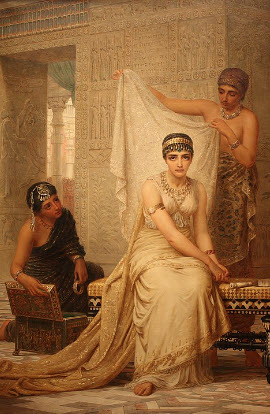The RemnantНамуна


Standing before the mirror, she transformed into a true beauty queen. Her maidens knew how to work magic and accentuate all her best features. She was an effortless beauty on a typical day, but on this day, she was a vision. She took a deep breath, hugged her servants goodbye, and wondered if she’d live to see the end of the day.

Queen Esther (1879) Edwin Long, Public Domain
The Book of Esther reads like a Hollywood movie that chronicles the life of an orphaned Jewish girl who became queen of Persia and saved her people from annihilation. It’s a heroine’s tale in which Esther is used to overthrow a satanic plot to destroy the Jewish people and stamp out the lineage of the promised Messiah.
The king’s top advisor Haman, fueled by his deep-seated hatred of the Jews, and specifically Esther’s uncle Mordecai, got the king to sign a decree that on a specific day, all the Jews were to be killed. After the king signed the order, Mordecai encouraged Esther to use her position to intercede for her people. Perhaps it was for such a time as this that she had been made queen (Esther 4:14).
But to go before the King without being called was a crime punishable by death, even for the queen. After calling for a three-day fast, Esther said, “I will go to the king, though it is against the law, and if I perish, I perish” (Esther 4:16).
Esther, dressed in her royal regalia, gathered her courage and stood in the courtyard outside the king’s throne room. When the king saw her, he called her in and extended to her his golden scepter. Not only did Esther not perish for approaching him, but he told her that he would give her anything she wanted, up to half of his kingdom. Her unusual request was for the king and Haman to join her for a feast that evening.
But at the dinner, the king realized there was more on Esther’s mind, and he asked her again what it was she wanted. Surprisingly, she requested another feast for the following night. But in the time span between the two dinners, Haman’s plans were foiled; he was humiliated and executed, Mordecai was exalted, and the Jews were saved and flourished in the land.
One of the most mysterious and controversial aspects of the Book of Esther is that there isn’t any mention of God in the story. It’s a miraculous story, without any explicit miracles, and there are just too many “coincidences” for it to be a story of happenstance. The absence of God’s name in its pages actually causes the reader to recognize the very presence of God at work in every detail.
The only satisfying explanation is that it was all part of the providence of God. Providence simply means that whatever happens in your life is according to the infinite wisdom of God. Isn’t it interesting that in the middle of our trials, we too might mistake God’s silence for his absence? Just as it was for Esther, his invisible hand of providence is always working behind the scenes, and behind what’s seen, to do good for those who belong to him. Just because you don’t see it or understand it, doesn’t mean he’s not providentially working for you.
One day you may see what lay behind what is now unseen, and know that God providentially worked to orchestrate every detail of your life for your good and his glory all along. Oh, for grace to trust him more.
Questions to Consider:
- God was providentially moving through all the details in Esther’s story. How does the invisible hand of God, which is always moving behind what’s seen, remind you that God’s in control of your life today?
- God used Esther’s courage to save the Jewish people from annihilation. Even though God isn’t mentioned in the book, he was preserving his remnant. How do you see God at work preserving his faithful remnant today?
About this Plan

God always preserves a remnant of true believers in an unbelieving world. They are his faithful witnesses who stand against the world’s systems, fleshly appetites, and devilish schemes. Often they stand alone facing floods, fires, lions, and giants, in order to faithfully follow God. In this seven-day plan, reconsider some of your favorite biblical stories through the eyes of the believing and courageous remnant.
More
Нақшаҳои марбут ба мавзӯъ

R.I.P or Rest in Peace With God Daily

Praying Through Financial Stress

A Family of Prayer

The BEMA Podcast: Session 1

Building a Life That Matters for Good - Buckle Up: Accepting the Free Gift of God’s Grace

The Next Step: Wisdom to Find Your Way Forward

Authentic Manhood

Anticipating Heaven

The Finish Strong: Transition Through Seasons Seamlessly
